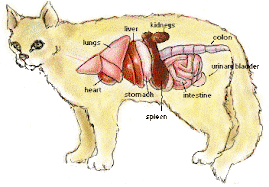Friday, October 12, 2007
HOW DOES MY PET GET TAPEWORMS
Posted by
THE ALLEY CAT FORUM
at
1:39 PM
![]()
Labels: CARTOON CAT, CAT, CAT ADOPTION, cat blog, CAT COLLECTING, cat furniture, CAT SHELTERS, cat vets, cat worms, CATS, dog worms, dogs, ebay, FELINE, FLEAS, KLIBAN, Tapeworms
Wednesday, October 3, 2007
TAPEWORM IN YOUR CAT
Here is the short version of the tapeworm.
Tapeworms release muscular egg packets into the intestine. These egg packets are about 1/2 to 3/4th of an inch long when they first exit the rectum and are capable of movement. They wiggle around, spewing out tapeworm eggs until they use up all their energy stores. Then they dry up and look like rice granules stuck in the hair of the cat.
Tapeworms are carried by fleas and are not uncommon in indoor only cats, due to this. Good flea control will prevent recurrence after your cat is dewormed for the tapeworms he has now. There are safe and effective tapeworm medications available from your veterinarian. They are prescription products so your vet may need to see your cat prior to dispensing them if it has been a while since his last visit.
Posted by
THE ALLEY CAT FORUM
at
7:24 AM
![]()
Labels: CAT HEALTH, cat worms, FLEA, tapeworm, Tapeworms, worms in cats




















 Custom
Custom 

